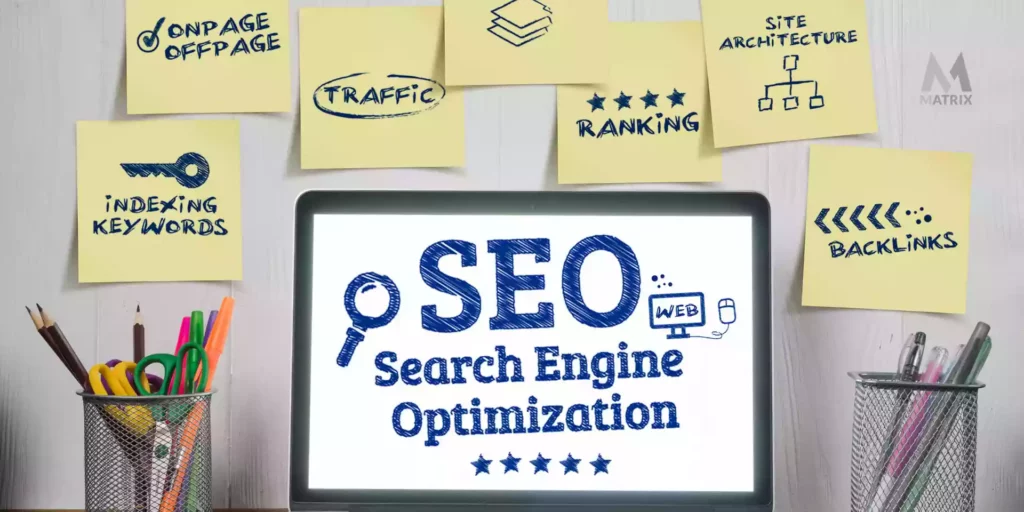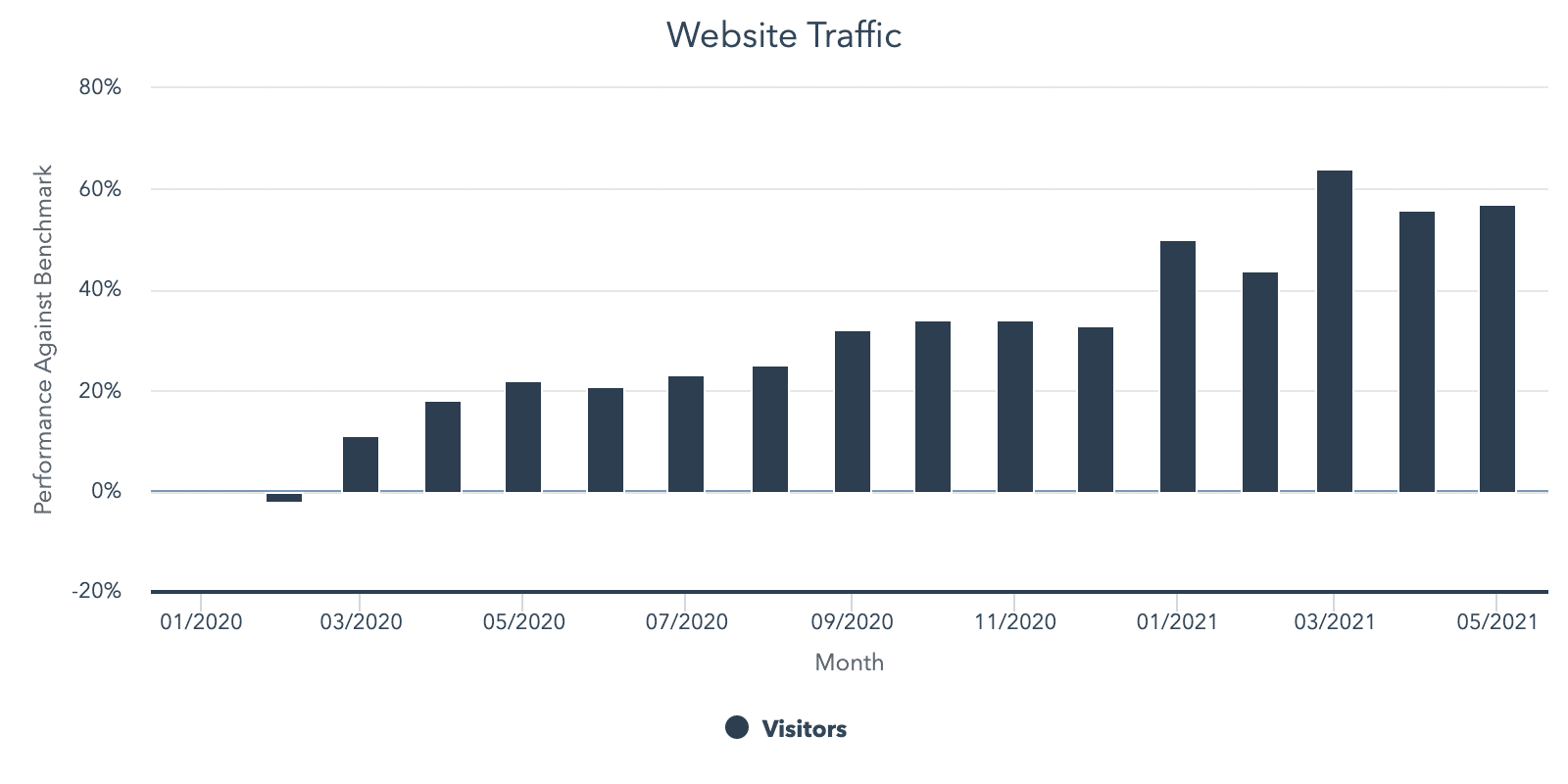SEO Marketing Doesn’t Happen Overnight
SEO marketing doesn’t happen overnight, but management wants a return on investment and needs to know the hurdle rate.
This is the most common question business owners ask before investing in SEO.
Unlike other marketing investments, SEO is a long-term investment that may take months to deliver any results. Your SEO Marketing plan is critical if you depend on organic leads.
With PPC, whether it is an e-commerce campaign or a lead generation campaign, you optimize your landing page for conversion, bid on selected keywords, and start monitoring results from day one.
The same goes for social media ads, and other paid marketing campaigns.
However, with SEO, you do not get immediate results. In most cases, after a few months of working with a freelancer or an agency, most business owners decide to either quit SEO altogether or switch their service provider.
If you google ‘how long does it take for SEO to work’ you will get a snippet from an article on Forbes that says “3 to 6 months”. At least that’s what I got before I started writing this article.
However, there are ways you can start tracking the effectiveness of your SEO campaign from day one.
First, you have to define success, i.e., you have to define the tasks that need to be performed and the KPIs that need improvement. But before we jump into that, let’s quickly cover the basics.
What are the benefits of doing SEO for Your SEO Marketing?
With the help of SEO, you can get free traffic (more exposure, more conversions) from search engines such as Google, Bing, and YouTube.
The higher you rank for high-volume keywords, the more traffic you can get. In most cases, organic leads cost less and convert better.
So if you are an ecommerce business and/or want to collect leads from your website, not doing SEO is not an option for you in the long run.
How do most business owners handle SEO Marketing?
Most business owners start with a freelancer or an agency, and wait for the results which may or may not come. Some try multiple SEO service providers before finding the right fit, and some even hire in-house SEO professionals.
It is the SEO professional’s job to keep the business owner’s expectations realistic and keep them well informed. It is the business owner’s job to do their research before hiring someone to do SEO for them.
The most important thing to do for both parties is to come to a mutual agreement about the action plan and the KPIs that need to be monitored.
The SEO Marketing Audit

An SEO audit checklist makes it easy to find the gaps in your content and SEO strategy.
If you want to rank on the search engines, you should start with an SEO audit checklist.
You have been investing in SEO for quite some time now, yet, you are not getting the results you wanted? To find and fix SEO problems and boost your performance in the hypercompetitive SERPs, you must conduct an SEO audit.
Follow this 9-step SEO audit checklist to identify SEO issues on your website and take actionable steps to eliminate them.
Check your Site’s Mobile-Friendliness
In 2020, mobile SEO should be the central part of your SEO strategy. Why?
First, the number of mobile searches is growing. Statistics say that 60% of Google searches come from mobile devices. By 2025, 73% of the world will access the internet via their mobile devices only.
Second, Google now prioritizes its Mobile-First algorithm, meaning that it ranks your website for both mobile and desktop searches using your site’s mobile version.
With Google’s Mobile-Friendly Testing Tool, checking website mobile-friendliness is easy. Technical SEO requires writing HTTP, js, PHP, and other code. All you need to do is enter your web page’s URL, and the tool will notify you about any issues. It will also provide additional tips on how to optimize your page for mobile.
Improve Website Speed with an SEO Audit Checklist

Apart from being one of the most significant ranking signals, your site’s loading speed is also a major UX factor. It determines how much time people will spend on your website, how they will interact with it, and whether they will convert.
One of the easiest ways to identify page speed problems is using website speed tests like PageSpeed Insights. These tools will provide actionable data, helping you understand how fast and optimized your site is.
If your site is slower than supposed, here is how to improve its speed:
- Clean your HTML code: Minify CSS, JavaScript, and HTML.
- Compress your images using tools like Kraken or Optimizilla.
- Upgrade your hosting plan.
- Minimize redirects.
Simplify your Website Architecture if Vital for Your SEO Marketing
Your website architecture is vital to understanding your website’s SEO health. Like its mere name says, your website architecture is the way your website pages are organized. The SEO audit checklist keeps you on track.
It allows Google to find and index all pages on your website faster. Site architecture also tells search engines what the most important pages on your site are. Logically, pages that are close to your homepage are more significant.
Precisely because of that, you want to avoid deep website architectures. Instead, keep your site architecture flat and follow the three-click rule. Simply put, your pages should never be more than three clicks away from your homepage.
If your navigation is too complex, you should consider hiring a developer to completely change it and make it more search engine- and user-friendly. You could also add internal links to your website pages and sidebars to point users to similar content. As long as they can reach any page on your site in 3 clicks, you are good.
Identify Indexing Problems
Finding indexing problems is a fundamental SEO practice. For starters, you should go to Google Search Console > Index Coverage. This report displays a list of pages that cannot be indexed.
You could also use Screaming Frog. This nifty tool crawls your website the same way search engines do. All you need to do is enter your URL and give you a list of pages it cannot access. With it, you can identify duplicate content, broken links, redirects, broken images, and noindex tags.
As per noindex tags, always double-check them. If you accidentally block your page’s access with the noindex tag, you can quickly fix this problem. On the other hand, if you added the noindex tag to a particular page because you do not want Google to index it, you shouldn’t remove it.
Analyze your Organic Traffic
When analyzing your website performance, checking how much organic traffic you are receiving is critical. This is where Google Analytics steps in. Click on Acquisition > All Traffic > Channels > Organic Search. This graph will show you how many people visited your website last month. You can also change the date range to track how your traffic has changed.
You can also go to the Landing Pages section in GA to see the overview of the most significant pages on your website.
Based on this data, you will know whether your SEO tactics work or if you need to set new, clearer benchmarks.
Boost your On-Page SEO
No matter how tedious it may be, on-page SEO is a critical aspect of your website performance. According to a case study by Moz, improving on-page SEO factors can improve organic traffic by 32%.
When boosting your on-page SEO, you should first identify the most important pages on your website, those that already rank well in the SERPs, optimized for an important keyword, or popular pieces of content that are losing popularity. Your goal is to reoptimize those pages by:
- adding a high-volume keyword to your title
- adding your main keyword in the first paragraph
- adding relevant and up-to-date external links to your content
- adding related internal backlinks
Audit your Backlinks with Your SEO Marketing Plan
In 2020, backlinks remained one of the most significant ranking factors. Backlinko has recently done a comprehensive study and learned that backlinks impact rankings more than any other ranking signal. That is why you should analyze them regularly.
Your SEO audit checklist will help you not miss anything.
Enter your homepage URL into the free backlink analysis tool, and it will show your backlinks. Pay attention to referring domains and the number of different sites linking to you. It would help if you also analyzed your Domain Authority a metric that calculates your site’s authority based on the quantity and quality of your backlinks.
Your goal is to eliminate malicious, spammy links. Pay attention to the quality of sites linking back to you. Most of your backlinks should come from authoritative blogs and news websites in the same industry and target the same people.
However, if you notice that many low-authority and or black-hat websites link back to you, you should disavow them. The same applies to spammy keyword-rich anchor text. Do you think a small business has time for this like a plumber doing SEO, after a long day?
Eliminate Broken Links with an SEO Audit Checklist
Broken links may heavily affect user experience and, therefore, impact your rankings. To identify broken links, you should first go to Google Search Console > Index Coverage. If there are any broken links on your site, you will see a Google 404 error (Submitted URL not found).
If the 404 error appears for the pages you previously deleted, you don’t need to worry. But, if this message appears for important pages on your website you want to rank for, you need to fix the broken link fast.
Next, you should use a broken link checker to audit your internal and external links. These tools are Ahrefs free Broken Links Checker, Dead Link Checker, or Broken Link Check.
Get the most out of your content.
Blogging remains the backbone of your SEO strategy including your SEO marketing. It lets you engage audiences, build trust with them, attract lots of organic traffic, and earn organic backlinks from authoritative sites. The only problem lies in the fact that the digital marketing landscape has become oversaturated.
To beat the competition and rank higher, you need to create high-quality content that is ten times better than the rest.
- Write short and to-the-point introductions. They should intrigue, inform, and inspire a user to keep reading the text.
- Keep your paragraphs sweet and short. Most of your readers will skim through your lengthy posts to find specific information. Small paragraphs will increase their experiences, as they are easier to follow.
- Add subheadings to break up your content into easy-to-digest chunks and help users navigate through the content easily.
- Use visual content, such as animations, photos, infographics, or videos, to make your content more visually appealing and engaging.
Wrap Up in SEO Audit Checklist and SEO Marketing
There are a plethora of website health factors you can choose to analyze. The ones mentioned above are among the most significant ones.
When conducting an SEO audit, you should never focus on a single aspect of SEO, such as backlinks or keyword density. Instead, look at the bigger picture and consider even the tiniest SEO practices that may help you perform better on Google.
Now let’s move to the SEO Metrics and KPIs.
Agreeing on SEO KPIs and tasks/action items is essential.
Some of the primary variables and KPIs that both parties need to agree on are as follows:
Top keywords before anything else, the freelancer or digital marketing agency you have hired needs to do keyword research and provide you with a specific list of keywords they are going after.
This needs to be a mix of short-tail and long-tail keywords and should have a decent search volume.
If the keywords you are going after have meager search volume (0-10 or 10-100 per month), your service provider will have a lovely time ranking for it, but you as a business owner will not get anything out of it.
You can use Google’s keyword planner to get search volume data for the keywords. No SEO campaign can be or should be started before both parties agree on a list of top keywords that you want to rank for, so make sure that’s the first thing you get from your SEO service provider.
Pages mapped to top target keywords
Once the keywords have been agreed upon, you need to decide which group of target keywords belongs on which page. Another way to look at this would be to ask yourself, which page you want to show up on the SERP when people search for a specific keyword.
Mapping the right keywords to the right pages is essential if you want your SEO campaign successful. Different keywords indicate different search intent, and if your page matches the user’s intent, you are more likely to get the results you want.
List of On-Page SEO Activities with a clear ETA
On-Page SEO activities range from content and image optimization on the page to fixing page load time, mobile optimization, and more. The good thing about all of these activities is that they are in the SEO service provider’s hands, i.e., they don’t have to wait for anyone to get these things done.
To create this list, your SEO service provider will first have to do a thorough audit of your website and see where the issues are. Your job is to make sure you agree on a reasonable ETA when everything will be optimized and make sure the timeline is being followed.
Depending on your website’s size and the number of pre-existing issues, it may take anywhere between a week and a month to get the necessary on-page SEO out of the way and move on to link-building.
Off-Page SEO/Link-Building Activities

When it comes to link building, you need to have clearly defined guidelines about the quality of links to be built as well as some minimum links that can be built every month.
The website, domain authority of the website, and the type of organic traffic the website gets are all good indicators of whether or not you should get a link from a website. Whether you are working with an agency or a freelancer, they should agree to build X amount of links per month, and you should hold them accountable for that.
How do you know that your SEO marketing strategy is working?
As we discussed earlier, it may take months for your SEO investment to start paying off. However, in the meantime, there are variables you can use as key performance indicators to see whether or not your SEO strategy is working.
8 Tips for Designing Your First Startup Website.
The following are some of those variables:
Keyword Rankings and SEO Marketing
Rank tracking is one of the most tried and tested methods SEOs use to measure performance. Remember the list of keywords you agreed on with your SEO team?
You can upload that on a keyword rank tracker and get a weekly update on how your website selects keywords.
If your ranks seem to be steadily improving, your SEO strategy for manufacturing is working and vice versa. However, things are not usually that straightforward, some keywords will go up, and some will go down.
You will need to keep a close eye on some of your high-priority keywords and your average rankings to see whether things are looking good.
Organic Traffic

One thing that should be continually improved for your SEO campaign is regularly keeping track of it weekly.
As your rankings improve, your traffic should improve. Keep a close eye on new users, sessions, and average session duration. You can get this data from Google analytics.
Business KPIs and SEO Marketing
There are very few SEO agencies and freelancers who would agree to use business KPIs to measure success. However, all of the on-page and off-page activities should result in business success for you.
For some, business success means increased revenue through e-commerce activities, and for some, it means an increased number of leads through organic traffic.
While your SEO marketing agency or freelancer may not agree to use business KPIs, you should keep an eye on variables such as increased revenue through e-commerce transactions, increased volume of organic leads, increased chats, inbound calls, and more. It is your SEO team/person’s job to bring relevant traffic to your website, and it is your job to monitor said traffic and optimize the website for better conversion.
What to do if your SEO marketing strategy doesn’t seem to be working?
So you have hired an SEO marketing agency (or a freelancer), they have been doing SEO for you for six months, and everything is going according to the roadmap. However, your SEO marketing strategy doesn’t seem to be working, and at this point, you are wondering why you are bothering with the $1000 per month on SEO marketing.
If that sounds familiar, and you are thinking about switching agencies or giving up on SEO altogether, do this first:
- Go to google analytics and start looking at your data from six months ago. Go into search console and look at metrics such as impressions, click-through rates, and top keywords.
- Look at this data month by month and see if there’s an upward trend or a downwards trend over the last six months.
- If there’s an upwards trend, I would recommend you stick with your service provider. This may be a bit of simple advice, and your situation may vary depending on the duration of the SEO campaign and the amount of money you are spending.
- If there’s a downward trend, give your SEO service provider a two-month notice.
This will depend on the kind of contract you have with them. A two-month notice is advisable in case there were some positives in the six-month data you reviewed.
This gives the agency/freelancer enough time to do a thorough review of what’s working and what’s not and take steps to improve their performance. If there are no positives in the six-month data, it is good to start looking for an alternative.
Learn about a guide to digital marketing for startups.
What happens if you switch SEO agencies too often?
Think of it as changing the route to your destination multiple times during a road trip. If you change your route once or twice, that may help you avoid heavy traffic, but you may end up going around in circles if you do it too often.
When you end your contract with your old SEO agency and hire a new one, they start the whole process from scratch. They will do their keyword research, backlink analysis, and on-page audit, and they will come up with their SEO plan.
This is not exactly a bad thing, as you will get to keep the links built by the previous service provider, and the new analysis may uncover some areas of opportunities.
That being said, there is a chance that a lot of progress made by the previous service provider will be lost as the new agency may decide to focus its energies on a new area.
When switching agencies, make sure you are on the same page about top keywords, and all the other variables discussed earlier in this article.
More often than not, the new agency will treat your website as a new website and your current rankings as the baseline they want to improve on. It is your responsibility to communicate your expectations to them and make sure any previous agency’s progress is not lost.
When you switch an agency, make sure you give them a few months while keeping a close eye on their performance and your organic traffic.
While there is such a thing as changing agencies too often, it might take you, multiple service providers, until you land with someone who’s the right fit for your organization.
How Are Your Web Pages Converting?
Do you want to see all your analytics on a dashboard?
What happens if you stop SEO marketing activities too soon?
Having read the article so far, you may have already guessed the answer to the question.
There are business owners out there that tried SEO marketing for a few months, did not see any return on their investment, and stopped their SEO campaign altogether. However, you will rarely hear of a successful online business that does not do any SEO.
One of the most effective alternatives to SEO is PPC. PPC also brings you immediate ROI if your campaign is optimized, and your landing page has a reasonable conversion rate.
When given a choice between SEO and PPC, business owners with limited resources are more inclined to do PPC.
However, PPC is not as scalable as you’d think. As you continue to bid on keywords, the price per keyword and the price per conversion keep going up. You also have to outbid the competition to stay on top, so your costs keep going higher and higher.
Meanwhile, if we assume that your conversion rate remains constant, your returns will remain constant. This means you will be spending more and getting the same returns.
When it comes to big businesses, I always recommend hiring in-house SEO resources. For small and medium-sized organizations, it is better to hire SEO agencies and freelancers. And for businesses that have minimal resources, I recommend taking a PPC-first and then SEO route.
The idea is to get some revenue going through your PPC campaign and then set aside some SEO resources. In short, not doing SEO marketing, or giving up on SEO is not an option, because you cannot survive on paid advertisement alone.
Some ground realities of SEO
Before you start investing in SEO, you should prepare yourself for the following:
- You will most probably go through a few agencies and freelancers before you find the right fit.
- There are many SEO agencies out there making unrealistic promises (dominate the SERPs, guaranteed rankings, etc.), so stay away from those who make promises that are too good to be true. SEO marketing takes time, science, and research.
- Google will continuously keep on rolling out algorithms that will make your SEO journey a turbulent one. Be prepared to lose traffic and rankings from time to time.
- Your SEO service provider may resort to black hat tactics to meet its goals. So keep an eye out for PBNs, spammy links, low-quality backlinks, and plagiarized content.
- Once SEO starts paying off, it will outperform every other channel, but that kind of performance takes years of dedicated hard work.
How to make sure your investment pays off
Throughout this article, we have discussed multiple variables that you need to track to ensure your SEO strategy is working and that you are on the right track.
That being said, as a business owner with limited resources, you have to invest some time in learning the basics of SEO. Or hiring an SEO company like Matrix Marketing Group.
For example, I have told you to keep track of your link profile, but if you do not know what a link profile is, you will not have productive discussions with your SEO service provider. So it may be worth looking into some free SEO courses online and making sure you know the basics.
After that, you need a rank tracking tool, a backlink tracking tool, and necessary google analytics skills to monitor your SEO campaign’s performance.
We hope this article was helpful to you. Please feel free to reach out if you have any questions or feedback. We would love to hear from you.
Here’s a glossary of important terms used in this SEO marketing guide:
- Index – Google stores all web pages that it knows about in its index. The index entry for each page describes the content and location (URL) of that page. To index is when Google fetches a page, reads it, and adds it to the index: Google indexed several pages on my site today.
- Crawl – The process of looking for new or updated web pages. Google discovers URLs by following links, by reading sitemaps, and by many other means. Google crawls the web, looking for new pages, then indexes them (when appropriate).
- Crawler – Automated software that crawls (fetches) pages from the web and indexes them.
- Googlebot – The generic name of Google’s crawler. Googlebot crawls the web constantly.
- SEO – Search engine optimization: the process of making your site better for search engines. Also, the job title of a person who does this for a living: We just hired a new SEO to improve our presence on the web.
We are listening.
Have something to say about your thoughts on SEO marketing?
Share it with us on Facebook, Twitter, or LinkedIn.
General FAQs
What is SEO?
What Is SEO? Search engine optimization (SEO) is the practice of getting targeted traffic to a website from a search engine’s organic rankings.
What is off-page SEO?
Off–page SEO” (also called “off–site SEO“) refers to actions taken outside of your website to impact your rankings within search engine results pages (SERPs).
What is on-page SEO?
On-page SEO is the practice of optimizing individual web pages to rank higher and earn more relevant traffic in search engines. On-page refers to both the content and HTML source code of a page that can be optimized instead of off-page SEO, which refers to links and other external signals.
Why is SEO important?
The strength of SEO and driving organic traffic is evident. Organic search usage and share are outpacing growth in other channels. Organic and paid dominated web traffic in 2020. Optimizing your web pages for SEO will be even more critical in 2021 as the organic search continues to rise above other search traffic.
What Denver SEO Company Gets Results.
Let the experts at this Denver marketing agency help you generate more web traffic, convert more leads, and close more sales. Our team knows just what it takes to build and maintain a proven marketing strategy that drives high-quality leads.

